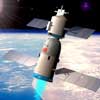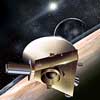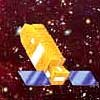|
Sunday:
July 27, 2003 | |
0520 GMT |
 |
Space entrepreneurs seek regulatory relief
Entrepreneurs creating new commercial space companies as well as those interested in investing in those companies said this past week that Congress needs to take several steps to improve regulations to allow those companies to flourish.
 FULL STORY FULL STORY
 |  |

|
 |
Next International Space Station crew named
Veteran NASA astronaut Michael Foale and seasoned Russian cosmonaut Alexander Kaleri are set to be the eighth crew to live aboard the International Space Station. They're scheduled to begin their mission in October, when they launch into space aboard a Russian Soyuz spacecraft.
 FULL STORY FULL STORY
 |  |

|
 |
|
Saturday:
July 26, 2003 | |
0433 GMT |
 |
Giant gas cloud made of atoms formed in first stars
Astronomers studying the most distant quasar yet found in the Universe have discovered a massive reservoir of gas containing atoms made in the cores of some of the first stars ever formed.
 FULL STORY FULL STORY
 |  |

|
 |
Canadian team maps halos around galaxies
Two University of Toronto astronomers and a U.S. colleague have made the first measurements of the size and shape of massive dark matter halos that surround galaxies.
 FULL STORY FULL STORY
 |  |

|
 |
|
Friday:
July 25, 2003 | |
0601 GMT |
 |
Pentagon strips 7 launches from Boeing Delta 4 rocket
The U.S. Air Force has revoked $1 billion of launches from Boeing's Delta 4 rocket program, handing them to rival Lockheed Martin's Atlas 5 rocket, as punishment for corporate mischief during the Evolved Expendable Launch Vehicle development.
 FULL STORY FULL STORY
 READ AIR FORCE ANNOUNCEMENT READ AIR FORCE ANNOUNCEMENT
 RESPONSE FROM BOEING RESPONSE FROM BOEING
 |  |

|
 |
China could begin manned spaceflight soon
China's clandestine manned space program could be just a few months away from its first human journey into orbit, a feat the nation has been striving toward for over a decade.
 FULL STORY FULL STORY
 |  |

|
 |
|
Thursday:
July 24, 2003 | |
0409 GMT |
 |
Two options emerge for NASA's Orbital Space Plane
Advocates for two differing generic designs for NASA's proposed Orbital Space Plane, a winged vehicle versus a capsule, made their cases for their preferred concepts during a Washington forum this week, debating the merits of advanced technology versus low-cost designs.
 FULL STORY FULL STORY
 |  |

|
 |
Pluto explorer to launch atop Atlas 5 rocket
NASA has tapped Lockheed Martin's Atlas 5 rocket to launch the world's first robotic expedition to the planet Pluto. The New Horizons mission is scheduled for launch in January 2006.
 FULL STORY FULL STORY
 |  |

|
 |
Investigators release report on X-43A launch failure
The NASA mishap investigation board, charged to review the loss of the X-43A Hyper-X program research vehicle during its June 2, 2001 launch, concluded no single factor or potential contributing factor caused the mishap. The flight failed because the vehicle's control system design was deficient in several analytical modeling areas, which overestimated the system's margins.
 FULL STORY FULL STORY
 |  |

|
 |
|
Wednesday:
July 23, 2003 | |
0156 GMT |
 |
Ham overcome by emotion when describing anguish
In an emotion-charged meeting with reporters, Linda Ham, chairman of NASA's mission management team and a lightning rod for criticism of decisions made - or not made - during the shuttle Columbia's ill-fated voyage, spoke publicly for the first time Tuesday, defending NASA's management practices but agreeing major changes are needed.
 FULL STORY FULL STORY
 |  |

|
 |
A pancake shapes distant galactic center
While a person's shape can be affected by pancakes, especially if you eat too many, you may not expect the same to be true on a cosmic scale. As it turns out, at least for the Circinus spiral galaxy, a pancake can shape an entire galactic nucleus.
 FULL STORY FULL STORY
 |  |

|
 |
Orbiting eyes help track hot fires on Earth below
NASA satellites' "eyes" above Earth are providing scientists and fire managers with powerful monitoring tools. NASA is providing the "big picture" needed to understand how fires behave before, during, and after damage has been done. A suite of NASA satellites, flying in coordinated fashion, offers the unparalleled insight only possible from space.
 FULL STORY FULL STORY
 |  |

|
 |
|
Tuesday:
July 22, 2003 | |
1205 GMT |
 |
Management team hardly discussed foam strike
Transcripts of meetings by senior NASA managers during the shuttle Columbia's ill-fated flight show mission management team chairman Linda Ham and other top officials, despite a dearth of technical data, simply did not believe falling insulation from the ship's external fuel tank could cause a catastrophic breach in the ship's left wing.
 FULL STORY FULL STORY
 STS-107 STORY DIRECTORY STS-107 STORY DIRECTORY
 |  |

|
 |

Audio coverage for subscribers only:
 AUDIO: STS-107 MMT Meeting January 17 QT AUDIO: STS-107 MMT Meeting January 17 QT
 AUDIO: STS-107 MMT Meeting January 21 QT AUDIO: STS-107 MMT Meeting January 21 QT
 AUDIO: STS-107 MMT Meeting January 24 QT AUDIO: STS-107 MMT Meeting January 24 QT
 AUDIO: STS-107 MMT Meeting January 27 QT AUDIO: STS-107 MMT Meeting January 27 QT
 AUDIO: STS-107 MMT Meeting January 30 QT AUDIO: STS-107 MMT Meeting January 30 QT
 SUBSCRIBE NOW SUBSCRIBE NOW

|
'Stunning' stat for parent stars of extrasolar planets
A comparison of 754 nearby stars like our Sun -- some with planets and some without -- shows definitively that the more iron and other metals there are in a star, the greater the chance it has a companion planet.
 FULL STORY FULL STORY
 |  |

|
 |
Team gives FUSE spacecraft triple brain transplant
NASA's Far Ultraviolet Spectroscopic Explorer satellite was given a new lease on life following the successful implementation of new software in three computers that work together to control the precision pointing of the telescope.
 FULL STORY FULL STORY
 |  |

|
 |
|
Monday:
July 21, 2003 | |
0640 GMT |
 |
Microflares on Sun could play major role in corona
The Sun's big, bright, explosive flares are the attention grabbers, but tiny, more numerous microflares may have nearly as much influence on the solar atmosphere, according to new data from the University of California, Berkeley's RHESSI satellite.
 FULL STORY FULL STORY
 |  |

|
 |
One step closer to next-generation spaceflight
The kerosene-fueled RS-84 engine, one of several technologies competing to power NASA's next generation of launch vehicles, has successfully completed its preliminary design review. The RS-84 engine development is part of NASA's Next Generation Launch Technology program.
 FULL STORY FULL STORY
 |  |

|
 |
SpaceDev wins small launch vehicle contract
SpaceDev has been awarded a Small Business Innovation Research contract by the Air Force Research Laboratory to design and begin the development of the SpaceDev Streaker small launch vehicle. SpaceDev Streaker will be designed to responsively and affordably lift up to 1,000 pounds to Low Earth Orbit.
 FULL STORY FULL STORY
 |  |

|
 |

